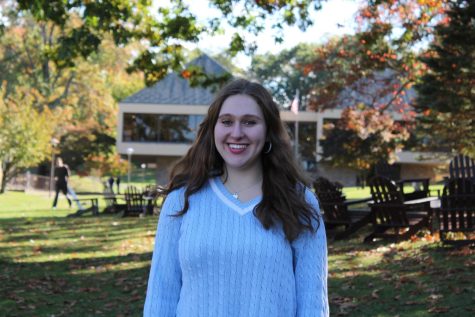Valentine’s Day
March 3, 2022
Valentine’s Day, a holiday celebrated across the world, has become more than just a day to honor partners. The winter months are short and cold; celebrations are far and few between, that is until Feb. 14. However, some members of the Masters community are not wholehearted fans of the holiday. Some are very ambivalent about the day. In an informal, self-selecting-response survey conducted by Tower, 53 people said they celebrated the holiday whereas 38 said they did not.
“For some, Valentine’s Day might be a reminder that you’re single and don’t have a partner to share it with,” junior Sophia Semczuk said. She continued, “I think a lot of high schoolers dislike Valentine’s Day because most are not in a relationship. Big grand gestures might be superficial to them.”
Librarian Jillian McCoy shared her earlier recollections of the day.
“I remember when I was young and single, feeling bad about Valentine’s Day. Once I was in a relationship years and years later, I just don’t care about it anymore. I feel like it’s a holiday that makes single people feel bad and that couples don’t really care about so much,” she said.
Galentine’s Day
Variations of the holiday have emerged – such as Galentine’s Day – dedicated to celebrating female friendships, which was popularized by the sitcom “Parks and Recreation”. Female students may share Valentine’s gifts with each other.
“My friends and I usually end up getting chocolate and candy for one another. It’s fun to do that kind of stuff and nice to show appreciation for your friends and share love, even if it is not in a romantic way,” Semczuk said.
“I have never celebrated Valentine’s Day romantically, in that sense but I have always celebrated with the people around me… I get chocolates and teddy bears for my friends. This is a way to show someone you appreciate them and it gets rid of the expectation that the holiday is only for couples,” senior Katie Williams said.
Galentine’s day has gained popularity in recent years. “I’ve never done it but I think I would prefer to get together with a big group of friends and celebrate that kind of love rather than have this holiday that really idealizes romance and the importance of having a relationship,” McCoy said.
“I definitely celebrate Galentine’s Day. In the past I have celebrated Valentine’s Day going out to dinner with my female friends or staying in and watching a movie,” Williams said.
Traditions
Some individuals without partners have created family traditions to celebrate the holiday with loved ones. “My dad always gets my mom flowers on Valentine’s Day and we put heart shaped decorations around the house, ” Semczuck said.
“I have always celebrated Valentine’s Day within my own family. My mom and I have always celebrated the day together,” Williams said. She continued, “I think it’s really special to show and receive love for people in your life when you might need an excuse to express your love for them.”
McCoy doesn’t celebrate Valentine’s Day in the traditional way. She said, “Not purposely; it just feels like a commercial experience. It feels like an excuse to sell heart-shaped things and my wife and I are not the kind of people who spend the type of time thinking about anniversaries, so it’s not really for us.”
As couples get older and settle down, Valentine’s Day might become less significant. “I usually babysit for my friends when they want to go out for Valentine’s Day. That’s how I help other people,” Shelly Kaye, Dean of class of 2022 and teacher said.
Whereas Ed Gormley, student activities and transportation coordinator, said, “Mrs. Gormley and I have the kind of relationship where every day is Valentine’s Day… We don’t really do any kind of tradition and we honestly don’t really get each other gifts. I don’t think I have bought her a card in at least 15 years. People think that’s not romantic but I kind of think it is. We both feel the same way.”
Inclusivity
For some, Valentine’s Day seems to lack inclusivity, because it can reinforce the heteronormative narrative of love.
“I think it’s important to make the holiday authentic and adopt your own traditions, whatever that may be,” Semczuck said. “We are at a point now where we can abolish those stereotypes and form a new image for Valentine’s Day. It’s a good way to de-stigmatize the negative portrayal regarding the holiday and include everyone.”
More and more people are feeling that Valentine’s Day should be more inclusive in order to prevent social pressures and allow the celebration of all types of love. “It’s nice to think about the true meaning of the holiday and the message it trying to convey,” Semczuk said.

Junior Luke Byrnes, co-president of Masters’ Gay Straight Alliance (GSA) shared his perspective on how widely-embracing the holiday can be to express love.
“I think the idea of Valentine’s Day, a day dedicated to love, is such a nice thing. It’s for friends, it’s for family, it’s for teachers … but you mostly associate it with romantic love, which is not really demonstrating inclusivity,” he said. “The marketing for Valentine’s Day only really shows straight people.”
“The best way for Valentine’s Day to become more inclusive is to get rid of the pressure and the stigma around the day and also get rid of the idea that the holiday is solely about generic[romantic] love and instead think of it more as just a celebration of love in general,” Williams said. She continued, “The responsibility on inclusivity is not just on people’s individual mindsets but really on corporations like Hallmark or Papyrus or other greeting card companies. I think if they widened the categories for greeting cards that would be a good start forward,” Williams said.
Commercialization and Consumerism
Byrnes added, “Valentine’s Day should be changed from the capitalist lens of consumption and exclusivity and instead should be about recognizing the important people in your life and expressing your love. It doesn’t matter what type of relationship you have with someone if you love them, you love them.”
“I think Valentine’s Day is about celebrating being a powerful woman and celebrating other powerful women. As co-president of GALS this is something that is really important to me,” Williams said.
Antipathy also comes from the holiday’s commercialization and focus on expensive gifts as displays of affection. “Sometimes big grand gestures can be a little bit over the top,” Semczuk said.
“I don’t agree with showing you love someone through material value… it turns into a competition of how much you can prove that you love someone through monetary gifts” Byrnes said.
The holiday can easily be seen as a money-making venture alternatively, sustainable meaningful gifts are an option.
“You really need to think is what I am buying going to last, is it something that will stay on this earth for a really long time, is it something of value… It’s not about being a perfect person but it’s really important to be conscious and be a smart consumer,” Williams said.
“I don’t think you have to be lonely on Valentine’s day because you’re not in a relationship. The chances are that even if you feel lonely there are A. a lot of lonely people around you, you’re not the only single person on Valentine’s day and B. You probably have lots of family and friends who you can celebrate with,” Williams said . The day is supposed to be about sharing love and appreciation but it’s true meaning can often be lost. “Valentine’s day is about appreciating people in your life and expressing and receiving love above all commercialization and consumerism,” Williams said. At its core Valentine’s Day is a celebration of cherished relations. Love comes in different shapes and forms to different people.



